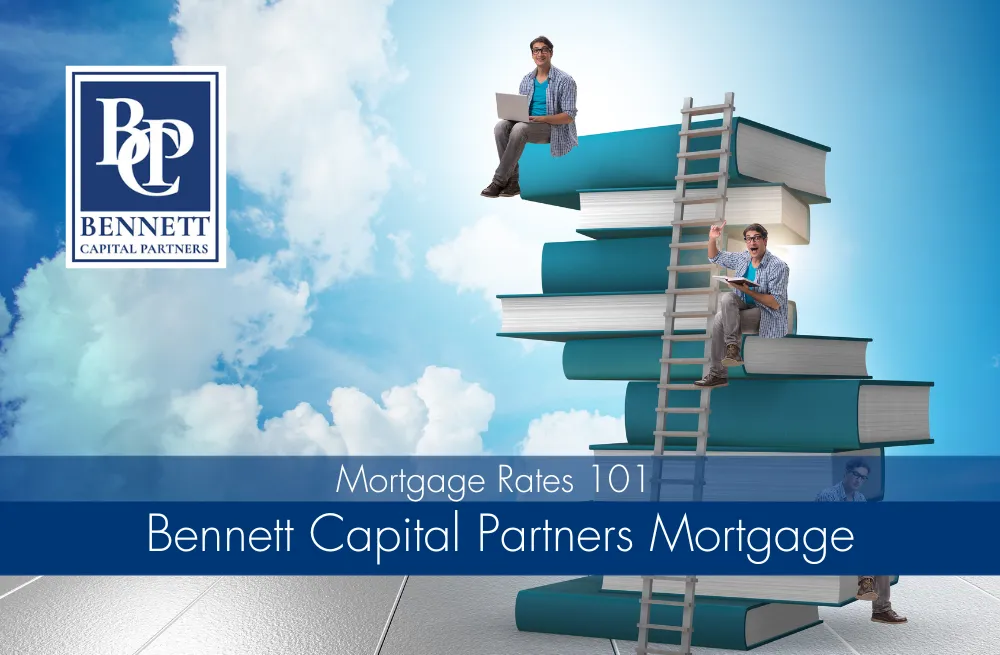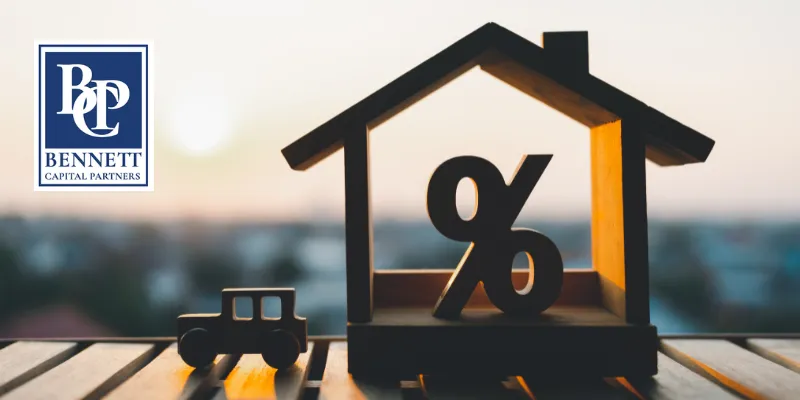Mortgage Rates 101
Updated: Jan 1

Buying a home is one of the biggest investments you'll make, and navigating the world of mortgage rates can be overwhelming. But don't worry - we've got you covered. In this article, we'll give you a crash course in Mortgage Rates 101, so you can make an informed decision.
We'll cover everything from the basics of mortgage rates and how they work, to the different types of mortgages available and strategies for securing the best rate for your unique situation.
By the end of this article, you'll have a solid understanding of mortgage rates and be ready to confidently make decisions about your future home purchase. Let's get started!
Quick Navigation - Click the link below to jump to that section..
What Is A Mortgage?

Well, it's essentially a loan that a home buyer gets from a bank or other financial institution to purchase a house. A mortgage allows you to borrow money for the purpose of buying a home, with the property itself serving as collateral for the loan.
The interest rate on your mortgage plays a significant role in determining how much you'll pay over time – and this is referred to as the mortgage rate.
Understanding the different types of mortgages available can help you choose the best option for your situation.
One popular type of mortgage is the fixed-rate mortgage, which has an interest rate that remains constant throughout the entire term of the loan. This means that your monthly mortgage payment will stay the same, making it easier to budget and plan for future expenses.
On the other hand, there's also adjustable-rate mortgages (ARMs), where interest rates can change periodically based on market conditions. With an ARM, your monthly payment may go up or down depending on whether interest rates increase or decrease.
When it comes to securing a favorable mortgage rate, your credit score plays an important role. Generally speaking, borrowers with higher credit scores tend to qualify for lower interest rates on their home loans because they're seen as less risky by lenders.
If you have a good credit score, you're more likely to get better terms and conditions on your mortgage, which could save you thousands of dollars in interest payments over time.
So why does understanding all this matter? Having knowledge about mortgages and their various components empowers you as a home buyer to make informed decisions when taking out a home loan.
By knowing what affects your mortgage rate and which type of loan works best for your needs, you can secure favorable terms that will ultimately affect your overall financial health and stability.
So take some time to learn about mortgages – it's one investment in yourself that pays off big in helping achieve homeownership!
Basic Parts Of A Mortgage

Imagine the excitement of finally finding your dream home, and now it's time to dive into the world of mortgage rates 101. Understanding the basic parts of a mortgage is crucial in making informed decisions about your home mortgage.
Let's break down these components to help you navigate through the mortgage process with ease, and get one step closer to owning your own home.
A fundamental aspect of any mortgage is whether it's a fixed rate mortgage or an adjustable rate mortgage. With a fixed rate mortgage, the interest rate remains constant throughout the entire life of the loan. This can provide stability and predictability for homeowners, as their monthly principal and interest payment will stay consistent over time.
On the other hand, an adjustable rate mortgage has an interest rate that changes periodically based on market conditions. While this type of loan may offer lower initial rates, there is a higher degree of uncertainty involved as future payments may change depending on fluctuations in market rates.
Another important consideration in understanding basic parts of a mortgage is choosing a reliable and trustworthy mortgage lender. The lender plays a significant role in the overall success of your home buying experience by providing you with personalized support and guidance throughout the loan process.
When selecting a lender, it's essential to do thorough research on their reputation, financial stability, customer service quality, and available loan products. It's also vital to discuss any questions or concerns you have about your potential home mortgage with them to ensure that you are fully informed about all aspects of your loan agreement.
The last key element in mastering mortgage rates 101 is being aware of the various terms associated with mortgages such as the 'mortgage term.' The term indicates how long you have to repay your loan – usually 15 or 30 years – which directly affects both your monthly payment amount and total interest paid over time.
A shorter-term often results in larger payments but less total interest paid while longer terms have lower monthly payments but more accumulated interest over time.
Understanding these components and their implications will enable you to make well-informed decisions during your mortgage process, helping you secure the best possible interest rate and terms for your unique financial situation.
What Is An APR?

Now that we've covered the basic parts of a mortgage, let's move on to a crucial component in understanding mortgage rates 101: the Annual Percentage Rate (APR).
The APR is a critical figure to consider when comparing different mortgage loan offers. It gives you an idea of the true cost of financing beyond just the interest rate on your mortgage. While the interest rate determines how much you'll pay in interest over the life of the loan, APR takes into account other factors such as fees and points, providing a more comprehensive view of what you can expect to pay.
To better understand how APR works, consider these primary components:
Interest Rate: The percentage charged on your total loan amount.
Fixed-rate mortgages: The interest rate remains constant throughout the entire loan term.
Adjustable-rate mortgages (ARMs): The interest rate changes periodically based on market conditions.
Fees and Points: Additional costs associated with obtaining a mortgage loan, such as origination fees, discount points, and closing costs. These can significantly impact your overall borrowing costs.
Loan Term: The length of time you have to repay your mortgage loan. A longer loan term may result in lower monthly payments but could also lead to higher overall costs due to accumulated interest.
It's essential to keep in mind that while APR is intended to provide borrowers with a more accurate representation of their borrowing costs, it's not infallible. Since it relies on human input and variables that can be manipulated, there might be instances where a slightly lower APR from one lender does not necessarily equate to a better deal for you.
In these cases, it's always recommended to consult with your real estate agent or financial advisor before making any final decisions.
When comparing various mortgage offers during the mortgage approval process, don't merely focus on finding the lowest interest rate or even an attractive APR. It would be best if you also considered other factors like loan term, flexibility of payment options, and lender reputation.
By taking a holistic approach to evaluating mortgage loans, you can make an informed decision that best suits your financial needs and homeownership goals.
How Are They Determined?

Delving deeper into the world of mortgage rates 101, one might wonder how exactly these interest rates are determined.
Well, a variety of factors come into play when mortgage lenders set interest rates for borrowers. Each borrower's unique financial situation and broader economic factors both contribute to the final rate offered on a mortgage loan.
Firstly, an individual's credit score plays a crucial role in determining their mortgage rate. Essentially, higher credit scores signal to lenders that the borrower is less risky and more likely to repay their loan on time. Consequently, those with higher scores are rewarded with lower interest rates.
The loan term and mortgage type also affect the interest rate – shorter terms generally result in lower rates while adjustable-rate mortgages may offer lower initial rates compared to fixed-rate mortgages.
Apart from personal financial standing, broader economic factors can impact how mortgage rates are determined. For instance, inflation and employment trends influence investor demand for bonds and mortgage-backed securities – affecting overall market interest rates. Additionally, lenders consider global events such as geopolitical tensions or changes in monetary policy by central banks when setting their own lending rates.
Lastly, certain aspects of the mortgage application itself can affect the final rate offered to borrowers. A larger down payment reduces the lender's risk exposure by lowering the loan-to-value ratio (LTV). This often translates into more favorable interest rates for borrowers who bring a significant amount of money upfront when purchasing a home.
By understanding these various components that dictate how mortgage rates are determined, prospective homeowners can better navigate their path towards securing an affordable home loan.
What Causes Mortgage Rates To Change?

Now that we have a better understanding of how mortgage rates are determined, let's delve into the factors that cause these rates to change. The fluctuations in mortgage rates can be attributed to various economic and financial factors which impact both the supply and demand for loans.
As a borrower, it is essential to grasp this concept as part of your mortgage rates 101 learning journey. By doing so, you will be better equipped to make informed decisions when it comes to securing the best possible rate for your home loan.
There are several key factors that contribute to changes in mortgage rates. Some of these include:
Economic indicators: A strong economy tends to result in higher interest rates as there is more demand for loans and other investments.
Weak Economy: Conversely, a weak economy may lead to lower interest rates as there is less demand for credit.
Inflation: High inflation results in higher interest payments on loans, causing lenders to raise mortgage rates in order to compensate for the increased costs.
Monetary policy: Central banks around the world, like the Federal Reserve in the United States, adjust their target interest rates based on economic conditions. When they increase these target rates, it usually results in higher mortgage rates.
Mortgage rates also vary based on individual borrower characteristics and loan terms. For example, borrowers with strong credit scores generally receive lower interest rates than those with poor credit scores because they present less risk of defaulting on their loans.
Additionally, adjustable-rate mortgages (ARMs) typically start with lower interest rates compared to fixed-rate mortgages but may see their interest rate adjust over time depending on market conditions.
As you continue building upon your knowledge of mortgage rates 101, remember that each borrower's situation is unique and certain factors will play a more significant role in determining your specific rate. It's crucial to understand how mortgage rates work so you can make informed decisions about what type of loan best fits your needs and budget constraints.
Keep an eye on economic indicators and trends, as well as your own credit health, to stay ahead of the game and secure the best possible rate for your home loan.
Locking Your Mortgage Rate

Now that you've got a handle on mortgage rates 101, it's time to dive into the exciting world of locking your mortgage rate. This crucial step in the home-buying process can make a significant difference in your monthly mortgage payment, so it's essential to understand the ins and outs of how it works.
First off, let's talk about why locking your mortgage rate is necessary. When you're purchasing a home, you'll be offered a fixed rate for your loan, but this may change daily depending on market fluctuations. By locking in a lower rate when available, you'll potentially save thousands of dollars over the life of your loan.
Of course, there’s always a chance that rates could go down after you lock in, but they could also go up—making it critical to keep an eye on trends and work with your lender to lock at the best possible time.
Now that we know why it's essential, let's discuss how to get your mortgage rate locked. Typically, lenders offer rate locks once you have a signed purchase agreement for the property and have completed their initial underwriting process. You can choose from various lock periods ranging from 30 to 90 days or more; however, longer lock periods may come with slightly higher rates or fees.
It’s essential to work closely with your lender during this stage to ensure you secure the best mortgage rate possible for your unique situation.
So there you have it—a quick rundown of how and why locking your mortgage rate is such an important step in buying a home. By staying informed about market trends and working closely with your lender throughout this process, you'll be well on your way towards achieving homeownership success while securing an affordable monthly mortgage payment.
Happy house hunting!
Securitization And MBS

Picture this: you're on your journey to homeownership, and you've just learned about mortgage rates 101. Now, let's dive deeper into how securitization and Mortgage-Backed Securities (MBS) play a significant role in the mortgage industry.
This process not only impacts the mortgage rates available to borrowers but also aids in making home ownership more accessible.
Securitization involves pooling multiple mortgages together and transforming them into bonds, which are then sold to investors as MBS. This is essential because it:
Allows banks and lenders to free up capital for additional lending
Provides investors with a relatively safe and stable investment option
Enables mortgage rates to be more closely aligned with other bond market rates
Encourages financial institutions to offer competitive mortgage products
The benefits of securitization extend beyond simply impacting mortgage rates. By bundling these loans together, lenders can spread the risk associated with default across multiple borrowers, thereby reducing their overall exposure.
This allows them to offer lower interest rates or require less stringent qualifications for loans, such as smaller down payments or lower credit scores. Additionally, some securitized mortgages may include mortgage insurance, which further protects lenders in the event of borrower default.
As we've seen, securitization and MBS play a crucial role in determining the cost of borrowing for homeownership. This process helps keep mortgage rates low and enables more people to achieve their dreams of owning a home.
So next time you're discussing conventional mortgages or diving into the intricacies of principal amounts and fixed periods of time, remember that securitization is at work behind the scenes – making it all possible while minimizing risks for both lenders and borrowers alike.
Overview / Conclusion

In this mortgage rates 101 crash course, you've had the chance to learn the basics of mortgage rates and how they can impact your home buying experience. This overview provided a solid foundation for understanding the different types of mortgages available, as well as various payment options.
By arming yourself with this knowledge, first-time home buyers can feel more confident when navigating the often confusing world of mortgages.
In addition to understanding mortgage rates, it's also essential to find the right lender who can offer competitive rates and terms. Different lenders may have distinct requirements, fees, and customer service standards that could significantly impact your overall satisfaction with your mortgage experience. Therefore, it's crucial to research multiple lenders before making a final decision on where to apply for your mortgage.
Another critical aspect of the home buying process is obtaining a mortgage pre-approval. Having a pre-approval in hand demonstrates to sellers that you are serious about purchasing their property and have already taken steps toward securing financing. This can give you an advantage in negotiations and help you stand out from other potential buyers who may not have obtained a pre-approval.
To wrap up our discussion on mortgage rates 101, we hope this overview has been helpful in providing a clear understanding of what factors contribute to determining mortgage rates and how these rates influence your overall home buying journey.
Whether you're just starting your search or preparing for closing day, having a strong grasp of these concepts will serve you well throughout the entire process.
5 Frequently Asked Questions about Mortgage Rates

What are mortgage rates?
Mortgage rates refer to the interest charged by a lender on a home loan. It is expressed as a percentage of the total loan amount and determines the amount of interest you'll pay over the life of the loan.
What factors influence mortgage rates?
Several factors can influence mortgage rates, including inflation, the state of the economy, government policies, and the supply and demand of credit.
What are the different types of mortgages?
There are several types of mortgages available, including fixed-rate mortgages, adjustable-rate mortgages, government-insured mortgages, and jumbo mortgages.
How can I secure the best mortgage rate?
To secure the best mortgage rate, you can start by shopping around and comparing rates from different lenders. You can also improve your credit score, save for a larger down payment, and consider working with a mortgage broker.
How do I know if I'm getting a good mortgage rate?
To know if you're getting a good mortgage rate, compare the rate you've been offered to current market rates and rates offered by other lenders. You can also use online calculators to estimate your monthly payments and total interest payments over the life of the loan.

Philip Bennett
Philip is the owner and Licensed Mortgage Broker at Bennett Capital Partners, Bus. NMLS # 2046828. He earned his degree in Accounting and Finance from Binghamton University and holds a Master's Degree in Finance from NOVA Southeastern University. With more than 20 years of experience, Philip has been a leader in the mortgage industry. He has personally originated over $2 billion in residential and commercial mortgages.
Learn more about Philip Bennett's background and experience on our Founder's page. Whether you're a first-time homebuyer or a seasoned real estate investor, our team is here to help you achieve your real estate goals. Don't wait any longer, contact us today and let us help you find the right mortgage for your needs.
Discover helpful tips and tricks on mortgages by reading our blog posts
Navigating the FHA Foreclosure Waiting Period: A Comprehensive Guide To learn more about how FHA foreclosure waiting periods work Click here to read the full article
Understanding Co-op Financing: Mortgages For Co-ops Explained. To learn more about how this program can help you purchase your Co-op. Click here to read the full article
Mortgage Solutions for Newly Employed Individuals: Exploring Job Offer Loans. To learn more about how this program can help you purchase your dream. Click here to read the full article
DSCR loan program: debt service coverage ratio mortgage | Bennett Capital Partner To learn more about how this program can help you with your investment objectives. Click here to read the full article
Can You Still Get a No-Doc Mortgage in 2023? To learn more about how this program can help you get your dream mortgage. Click here to read the full article
How to Get Foreclosure Bailout Mortgages: A Step-by-Step Guide. To learn more about how this program can help you with your foreclosure bailout. Click here to read the full article
How to Qualify for an FHA Loan in Miami: The Complete Guide. To learn what the FHA loan limits are. Click here to read the full article.
